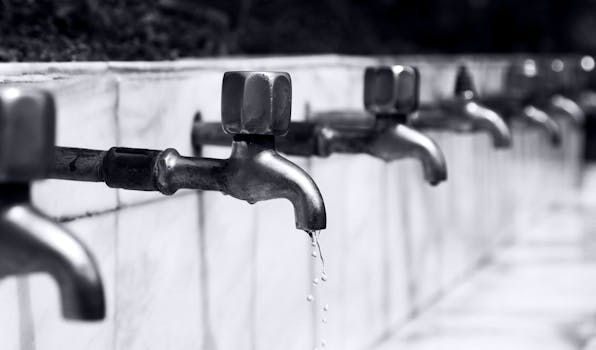
Image by PS Photography on Pexels
Leaky Taps: A Common Issue That Can Drain Your Budget
A leaky tap can be frustrating, especially during hot summer months or after a sudden rain shower. The water pressure may drop, causing the faucet to run continuously, wasting water and money on your utility bills. Leaky taps are often caused by worn-out O-rings, gaskets, or washers in the faucet's cartridge or aerator. To prevent leaks, inspect your faucets regularly for signs of wear or damage. Turn off the main water supply valve before starting any maintenance work. If you find a leak, turn off the water supply and replace the faulty part as soon as possible. For minor repairs, consider using a replacement O-ring or gasket kit specifically designed for your faucet model. When to Call Professionals?- A leaky tap can cause water damage to walls, ceilings, and floors if left unchecked.
- If you've tried DIY solutions and the issue persists, it's best to consult a professional plumber for further assistance.
- Leaky taps can also lead to increased energy bills due to increased hot water usage.
Clogged Drains: A Common Problem That Can Be Avoided
Clogged drains are a common plumbing issue that can cause unpleasant odors, decreased water pressure, and even electrical issues. Clogs can be caused by hair, grease, soap scum, and other debris that accumulate in the pipes. To avoid clogged drains, it's essential to regularly clean your drains using a drain snake or plumber's auger. For more severe clogs, consider calling a professional plumber who has the necessary equipment and expertise to clear the blockage. DIY Tips:- Use a drain snake with flexible rods to reach deep-seated clogs.
- Apply baking soda and vinegar to help break down grease and debris.
- Pour hot water down the drain after using harsh chemicals or cleaning products.
Low Water Pressure: A Common Issue That Can Be Addressed
Low water pressure can be caused by a range of factors, including mineral buildup in the pipes, kinked or blocked pipes, or worn-out fixtures. To address low water pressure, consider these DIY tips:- Check your shut-off valves to ensure they're fully open.
- Inspect and clean your faucets, drain lines, and water heater for any blockages.
- Consider installing a whole-house water filter to reduce mineral buildup.
- Low water pressure can be a sign of more serious issues, such as a faulty main water line or burst pipe.
- If you've tried DIY solutions and the issue persists, it's best to consult a professional plumber for further assistance.
- Low water pressure can also affect your appliance usage, with some devices using significantly more water than others.
Benefits of Replacing Your Water Heater
A new water heater can be a significant investment, but it can provide long-term benefits and savings. A replacement water heater can:- Reduce energy bills by up to 30%: A new water heater can use less energy to heat water, resulting in reduced utility costs.
- Extend the lifespan of your appliances: Replacing an old or inefficient water heater can help extend the life of other devices in your home.
- Provide improved safety and comfort: A reliable water heater can provide hot water for bathing, washing dishes, and other household tasks.
- Q: What are the most common causes of leaky taps?
- Q: How can I prevent clogged drains?
- Q: What are some DIY tips for low water pressure?